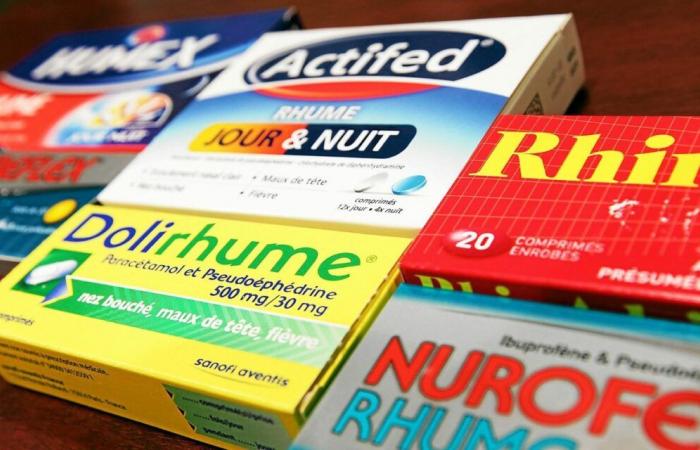What these drugs all have in common is that they contain the pseudoephedrine molecule. The main ones are called Actifed Rhume, Dolirhume, Humex Rhume, Nurofen Rhume and Rhinadvil Rhume. Available without a prescription in the form of tablets, these treatments – also sold by nasal spray on prescription – aim to decongest and unclog the nose. These are therefore the main medications used against colds.
But they have been the subject of numerous criticisms for several years, starting from the National Medicines Safety Agency (ANSM) itself because they can cause serious side effects such as strokes and heart attacks. “The delivery of these medications without a medical prescription no longer appears appropriate,” the ANSM said on Thursday. She says she is considering “listing” these treatments, a measure which would take effect immediately and would effectively result in them no longer being available over the counter in pharmacies.
A long leaflet
The measure envisaged by the medicines agency – relayed in recent weeks by specialized titles such as Le Quotidien du Pharmacien – is, as such, the last episode in a long series which has seen it, little by little, harden its positions regarding this family of treatments.
In 2023, it had, for the first time, explicitly recommended against their use. This decision had, for a time, caused sales of anti-cold treatments to decline. But these have been rebounding since September, a situation that the ANSM considers particularly worrying “ahead of the winter season” and its procession of diseases.
Why not ban these drugs outright? French health authorities regularly explain that their hands are tied by European regulations, which make the withdrawal of an authorization subject to the opinion of the European Medicines Agency (EMA). However, it considered, last year, that the anti-cold treatments concerned did not present sufficient risks to ban them, even if it imposed new contraindications.
This opinion is explained by the fact that serious side effects remain very rare. A few are reported each year and, in France, no deaths have been reported.
Disagreement between European and French authorities
The European and French authorities are therefore in disagreement, the latter considering that the risk, even low, is unacceptable given the benign nature of the illness being treated: a simple cold. “Too many patients remain exposed to serious risks compared to the modest benefits of these drugs,” judges the ANSM.
This position is in line with the main French learned societies – ENT specialists, general practitioners, pharmacists – who all oppose the use of these drugs.
Dissatisfied pharmacists
It risks, on the other hand, offending pharmacists, many of whose representatives believe that such a restriction unfairly reduces the range of medications to be offered to their customers with colds, in a context marked by recurring difficulty in obtaining medical appointments. .
“It will become complicated for us to respond to patients’ problems, people will no longer have a doctor and we will no longer be able to advise anything,” estimates, in the Quotidien du Pharmacien, Béatrice Clairaz-Mahiou, co-president of the French-speaking Society of Pharmaceutical Sciences (SFSPO).
But, for other observers, the health authorities have, on the contrary, already been too slow to react.
“Caregivers have better things to do than spend time advising patients against a drug that should be withdrawn from the market,” estimated the independent journal Prescrire at the beginning of the year, seeing in the European decision a “missed opportunity (to ) protect patients.
Health






